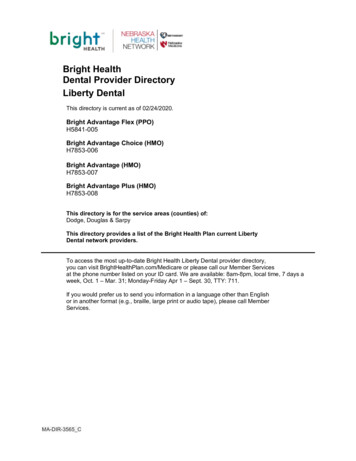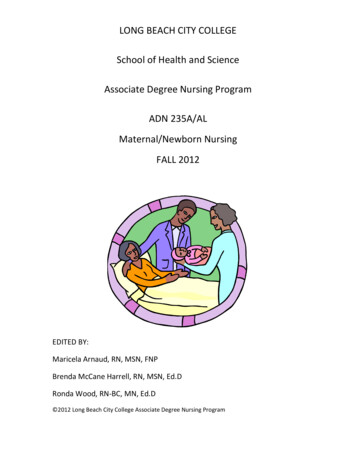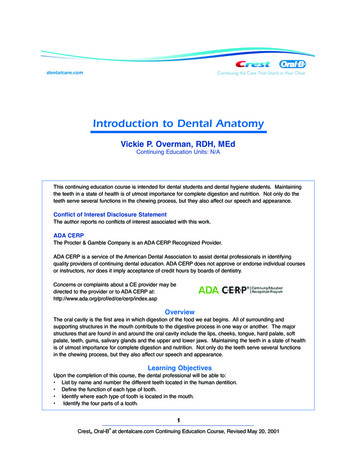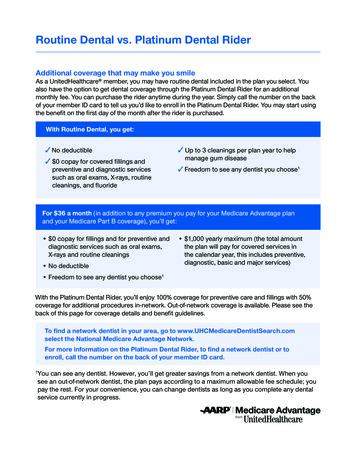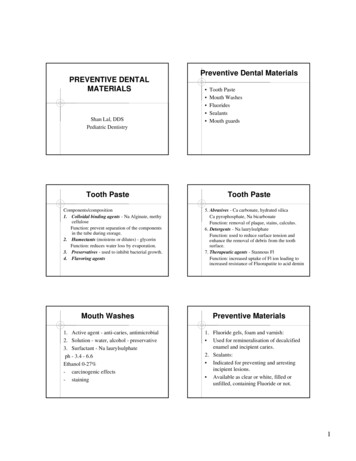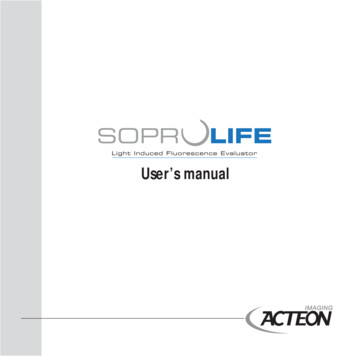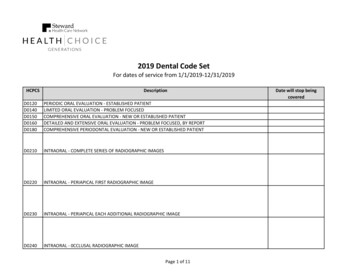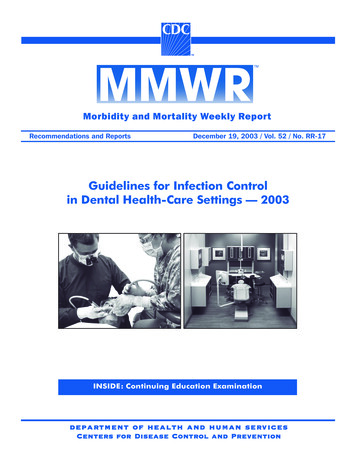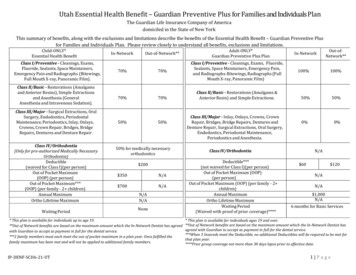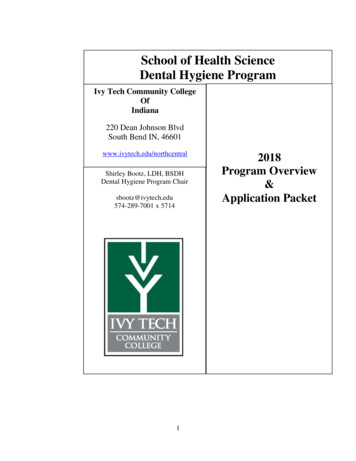
Transcription
School of Health ScienceDental Hygiene ProgramIvy Tech Community CollegeOfIndiana220 Dean Johnson BlvdSouth Bend IN, 46601www.ivytech.edu/northcentralShirley Bootz, LDH, BSDHDental Hygiene Program Chairsbootz@ivytech.edu574-289-7001 x 571412018Program Overview&Application Packet
Table of ContentsContentGeneral Program InformationPage Number3College Policies4Bloodborne Pathogens and Infectious Disease Policy4Bloodborne Pathogens & Airborne Pathogens Exposure Protocol5Accreditation Information9Dental hygiene program purpose statement9Dental hygiene program mission statement9Profession of dental hygiene10Admissions process11Candidate selection process14Directions for viewing the on-line information session17Dental hygiene on-line information session verification18Background check and drug screening policy19Dental hygiene curriculum20Essential functions of dental hygiene students22Estimated fees24Dental hygiene program application26Frequently asked questions302
Ivy Tech Community CollegeDental Hygiene Program InformationDental hygiene is a limited enrollment program which means only a limited number of students areaccepted into the program each year. We currently accept 15 students a year into the program. Theprogram begins in the fall semester of each year and is approximately 2 years in length. There are8 pre-req courses that must be completed prior to entering the program. The dental hygieneprogram is a full-time, primarily daytime program. In spring semester students will also be requiredto attend evening clinics. Our students are in classes, labs or clinics Monday through Friday andare on campus anywhere from 16-26 hours a week depending upon the semester.Graduates are awarded an Associate of Applied Science degree and are eligible to take licensingexams.Please review this application packet carefully as it outlines the application process for the fall2018 dental hygiene program including the required pre-req courses and deadline dates forsubmitting the required information. If after reviewing the packet, you have any questions orwould like to schedule a time to meet, please feel free to contact me. You will need to contact mein the fall for the dates of the face-to-face info sessions for the 2018 dental hygiene applicants.Psychology and sociology can be taken prior to getting into the program or once accepted into theprogram. Refer to pages 20 & 21 of the application packet for further information.We require individuals applying for admission into the dental hygiene program to have eithercompleted TEAS 5.0 version prior to August 30, 2016 (two year limit on scores) or complete theATI TEAS. Below is a link to a website which will provide additional information regarding theTEAS test. The TEAS test can be taken at any Ivy Tech testing center. There is a fee each time thetest is taken (approximately 65.00). The test takes about 4 hours to complete. You need to set-upan on-line account to register for the TEAS through the ATI website, and schedule an appointmentin the testing center. You can schedule an appointment through the following link:www.ivytech.edu/schedulenowBelow is a link to a website which will provide additional information regarding the TEAS sPlease let me know if you have any questions regarding this information.Sincerely,Shirley BootzAssistant ProfessorDental Hygiene Program ChairIvy Tech Community College574-289-7001 x 5714sbootz@ivytech.eduNON-DISCRIMINATION AND EQUAL OPPORTUNITY POLICY3
Ivy Tech Community College provides open admission, degree credit programs, coursesand community service offerings, and student support services for all persons regardless ofrace, color, creed, national origin, religion, sex, physical or mental disability, age orveteran status. The College also provides opportunities to students on the same nondiscriminatory opportunity basis. Persons who believe they may have been discriminatedagainst should contact the campus affirmative action officer, Director of HumanResources, or Dean of Student Affairs.BOOKLET DISCLAIMERThis booklet is intended to supply accurate information to the reader. The College reservesthe right to change the Program and course requirements; however, every effort will bemade to inform students of any program changes. This handout and its provisions are not inany way a contract between an applicant and the College.Bloodborne Pathogen PolicyHealthcare personnel are at risk for occupational exposure to bloodborne pathogens,including hepatitis B virus (HBV), hepatitis C virus (HCV), and human immunodeficiencyvirus (HIV). Exposures occur through needlesticks or cuts from other sharp instrumentscontaminated with an infected patient’s blood or through contact of the eye, nose, mouth,or skin with a patient’s blood. Important factors that influence the overall risk foroccupational exposures to bloodborne pathogens include the number of infectedindividuals in the patient population and the type and number of blood contacts. Dentalhygiene students are required to have up-to-date immunizations and an annual TB test.All dental assisting and dental hygiene faculty are strongly encouraged to have up-to-dateimmunizations and an annual TB test. All dental hygiene faculty and students are requiredto use proper infection control measures, including the use of PPE (personal protectiveequipment) when working in the dental hygiene clinic.Policy Regarding Faculty, Staff or Students Who Have Infectious DiseaseIt is the policy of the dental hygiene program that any student enrolled in the program,faculty teaching in the program, or student applying to the program who poses a risk oftransmitting an infectious agent should consult with the appropriate health careprofessionals to determine whether providing professional services would represent anymaterial risk to the patient. If such a risk is possible, the faculty or student will not beallowed to engage in any professional activity that would create a risk of transmission ofdisease to others.All procedures regarding this policy will ensure confidentiality of information inaccordance with HIPAA guidelines.4
BLOODBORNE AND AIRBORNEPATHOGENS EXPOSURE PROTOCOLEffective August 15, 20175
What Are Bloodborne Pathogens?Bloodborne pathogens are infectious microorganisms in human blood that can cause disease. Thesepathogens include, but are not limited to, hepatitis B (HBV), hepatitis C (HCV) and humanimmunodeficiency virus (HIV). Exposures may occur through needle sticks or cuts from other sharpinstruments contaminated with an infected patient’s blood or through contact of the eye, nose, mouth, orskin with a patient’s blood.What to Do When a Bloodborne Pathogen Exposure Occurs:If you experience a contaminated needle stick or sharps cut, or are exposed to the blood or other bodyfluid of a patient during the course of your work, immediately follow these steps: Wash needle sticks and cuts with soap and waterFlush splashes to the nose, mouth, or skin with waterIrrigate eyes with clean water, saline, or sterile irrigatesReport the incident to your Ivy Tech instructor and clinical supervisorImmediately seek medical evaluation and treatment by a medical professional. Do not wait.Source testing of blood to determine infectious disease status is preferred whenever possiblewhere consent has been obtained. When an exposure occurs at a clinical facility, you shouldfollow that facility’s policy as they will handle notice and consent with the source. When anexposure occurs at an Ivy Tech facility, the instructor should advise the source following anincident and ask if the source will consent to testing at a medical provider of his or her choosing.Review these suggested resources:o Exposure to Blood: What Healthcare Personnel Need to Know(CDC): http://www.cdc.gov/HAI/pdfs/bbp/Exp to Blood.pdfo Emergency Needle Stick Information l.htmlo Post-Exposure Prophylaxis (PEP) pep-resources/pep-quick-guide/For clean needle/sharp sticks, wash the affected area with soap and water. You do not need to seekmedical care unless there is a visible injury which requires attention. Report the incident to your IvyTech instructor and clinical supervisor.Where to Seek Treatment: You may seek treatment at the clinical site (if equipped and willing), an urgent care facility,emergency room, or physician office for assessment, diagnosis, and treatment. It remains yourresponsibility to obtain the initial appointment and any follow-ups ordered with a health careprovider of your choice. If an incident occurs in an Ivy Tech classroom, lab or facility, aninstructor cannot provide evaluation, diagnostic test or treatment beyond first aid andemergency assistance.6
Time of day and facility capability may impact where you seek treatment. The key is to knowyour options before an accident, and then, obtain an evaluation and treatment as soon aspossible from a health care provider of your choosing.Report the incident to your Ivy Tech instructor and submit a Student Accident Report promptly,but no later than 24 hours. The accident report is a web-form completed via MyIvy Student Student Resources Policies & Procedures or at www.ivytech.edu/accident.What Happens Next?A health care provider will provide an evaluation, diagnostic testing (if necessary), and treatment (ifnecessary). Diagnostic testing may include testing the source of the exposure, with his or her consent,and baseline testing of the exposed person. Testing for HIV, HBV, and HCV is typically included, alongwith other blood tests or diagnostic examinations the health care provider recommends. If post- exposureprophylaxis (PEP) is indicated, efficacy is time sensitive. The first dose should be given as soon aspossible. Optimal time to start PEP is within hours of exposure, rather than days1.Will I need follow-up testing? This direction will come from the health care provider. Follow-upwill depend upon the testing outcome of the source person. It is important for your health that youunderstand and comply with the provider’s follow-up testing and recommendations.Additional resources:1. How to Protect Yourself From Needle Stick Injuries 2000-135.pdf2. National Institute for Occupational Safety and ult.html3. General Guidance on OSHA’s Bloodborne Pathogens Standard ns/gen guidance.html1Clinician Consultation Center – ces/pep-quick-guide/7
What Are Airborne Pathogens?Airborne Pathogens are infectious microorganisms which can be transmitted through air and could cause disease.The discharged microbes may remain suspended in the air on dust particles, respiratory and water droplets.Tuberculosis, or TB, is an airborne pathogen of concern. TB is spread through the air from one person to another.The bacteria are put into the air when a person with TB disease of the lungs or throat coughs, sneezes, speaks, orsings. People nearby may breathe in these bacteria and become infected.What to Do When an Airborne Pathogens Exposure Occurs:If you think you have been exposed to an airborne pathogen (i.e. tuberculosis) without appropriate PersonalProtective Equipment (PPE), you should immediately contact your Ivy Tech instructor and clinical supervisorand seek testing at an urgent care clinic, emergency room, or physician office. Be prepared to tell the doctor ornurse when you were exposed to the airborne pathogen, what type of exposure you think occurred(contaminated air with or without respiratory tract droplets, mucus, or blood), and if the source patient of thecontamination is being tested for airborne pathogens.Additional resources:1. TB Elimination - Infection Control in Health-Care eets/prevention/ichcs.pdf2. CDC Division of TB: http://www.cdc.gov/tb3. Indiana TB Control Office:Indiana Department of2 North Meridian Street, 6th FloorIndianapolis, IN 46204Tel: 317-233-7545Fax: 317-233-77474. National Institute for Occupational Safety and Health: http://www.cdc.gov/niosh/topics/tb/5. OHSA: http://www.osha.gov/SLTC/tuberculosis/index.html6. Respiratory Protection in Health-Care Settings (CDC) Fact s/prevention/rphcs.htm8
INTRODUCTIONThis packet introduces you to the application process for the Dental Hygiene Program atIvy Tech Community CollegeACCREDITING ORGANIZATIONSRegional Accreditation StatementIvy Tech Community College is accredited by The Higher Learning Commission of theNorth Central Association of Colleges and Schools.The Higher Learning Commission230 South LaSalle St., Suite 7-500; Chicago, IL 60604-1413(800) 621-7440 or (312) 263-7462 Fax: (312) 263-0456http://www.ncahlc.orgProgram AccreditationCommission on Dental Accreditation211 East Chicago AvenueChicago, Illinois 60611312/440-4653www.ada.org/codaLink to dental hygiene accreditation standards:http://www.ada.org/ /media/CODA/Files/2016 dh.ashxPURPOSEThe purpose of the dental hygiene programs is to provide education leading to an Associate of AppliedScience in Dental Hygiene degree. Upon successful completion of the program, graduates are eligible toapply to take the Dental Hygiene National Board examination and any regional or state clinical licensingexam which are required to obtain state licensure as a Licensed Dental Hygienist.Dental Hygiene ProgramMission StatementThe goal of the dental hygiene programs at Ivy Tech Community College is to advance the mission of thecollege by providing quality educational programs which will graduate competent oral health professionalswho through critical thinking, ethical decision making and lifelong learning will meet the preventive dentalneeds of the diverse communities we serve.9
Who Is the Dental Hygienist?*Dental hygienists are licensed oral health professionals who focus on preventing and treating oral diseases-both toprotect teeth and gums, and also to protect patients' total health. They are graduates of accredited dental hygieneeducation programs in colleges and universities, and must take written national board examination and clinicalexamination before they are licensed to practice. In addition to treating patients directly, dental hygienists also work aseducators, researchers, and administrators.What Do Dental Hygienists Do?Each state has its own specific regulations and the range of services performed by dental hygienists varies from onestate to another. As part of dental hygiene services, dental hygienists may: perform oral health care assessments that include the review of patients' health history, dental charting, oralcancer screening, and evaluation of gum disease / health;expose, process, and interpret dental radiographs (x-rays);remove plaque and calculus (“tartar”) from above and below the gumline using dental instruments;apply cavity-preventive agents such as fluorides and sealants to the teeth;administer local anesthetic and / or nitrous oxide analgesia;educate patients on proper oral hygiene techniques to maintain healthy teeth and gums;counsel patients about plaque control and developing individualized at-home oral hygiene programs;administer smoking cessation programs; andcounsel patients on the importance of good nutrition for maintaining optimal oral health.Where Do Dental Hygienists Work?Clinical dental hygienists may work in a variety of health care settings such as private dental offices, schools, publichealth clinics, hospitals, managed care organizations, correctional institutions, nursing homes or in a corporateenvironment. In addition to the clinical role, dental hygienists may also work in an administrative capacity in any ofthe above locations.What Does the "RDH" Designation Mean?The "RDH" means Registered Dental Hygienist. The RDH credential identifies a dental hygienist as a licensed oralhealth professional. State licensure requirements typically indicate that a dental hygienist must graduate from anaccredited dental hygiene education program, successfully pass a national written examination, and a state or regionalclinical examination. (In Indiana, the designation LDH [Licensed Dental Hygienist] can be utilized instead of RDH.)*Important Facts About Dental Hygienists: http://www.adha.org/resourcesdocs/72211 Important Facts About Dental Hygienists.pdf (accessed July 17, 2017)10
ADMISSION PROCESSFifteen (15) students will be accepted annually into the dental hygiene program. The program will begin in the fallsemester of each year. Applicants will be selected based upon a points system described in this packet.Deadline for submitting application and all supporting materials: April 5, 2018Applicants must complete all the following requirements to be considered for admission into the dental hygieneprogram. Incomplete applications will not be considered for admission.I.General College Admission Requirements: Achieve admission into the College by meeting Ivy TechCommunity College admission requirements. Contact the Office of Student Affairs for an enrollment packetor apply online at http://www.ivytech.edu/apply-now/ NOTE: Admission to Ivy Tech does not guaranteeadmission to the dental hygiene program. . Applicants must complete requirements for general admission tothe college including the completion of all required academic skills classes.Submit official transcript(s) from all colleges / universities (other than Ivy Tech) you have attended to theregistrar. This will allow the registrar to award transfer credit for courses completed. Applicants whoreceived college credit for any of the required pre-req courses by completing high school AP courses examsmust also submit official high school transcripts to the registrar.Transcripts should be mailed to:Ivy Tech Community CollegeOffice of the Registrar220 Dean Johnson BlvdSouth Bend, IN, 46601II.Application process to the dental hygiene program:A. Complete an application for the dental hygiene program. Obtain copies of unofficial collegetranscripts from ALL colleges and universities you have attended (including Ivy Tech CommunityCollege), and include them with your admission application. Applicants who received college credit forany of the required pre-req courses by completing high school AP courses exams must also submit anunofficial copy of their high school transcripts. Applications submitted without all unofficial collegetranscripts will not be considered. Submit your TEAS test results with your application. Mail or handdeliver your dental hygiene application, TEAS test scores, unofficial transcripts and verification ofcompletion of the on-line information session (if applicable) by the deadline of April 5, 2018 foradmission in August. Mailing address:Ivy Tech Community CollegeSchool of Health SciencesDental Hygiene Program Chair220 Dean Johnson BlvdSouth Bend, IN, 46601B. Register for and complete all portions of the TEAS test by April 5, 2018. TEAS 5.0 completed prior toAugust 30, 2016 (two year limit on scores) or ATI TEAS completed on or after August 31, 2016 will beaccepted. The TEAS is administered by the Ivy Tech testing center. Applicants need to set-up an on-lineaccount through the ATI website to register for the TEAS, and schedule an appointment in the testingcenter. You can schedule an appointment through the following link: www.ivytech.edu/schedulenowApplicants will need to contact the testing center for information regarding costs, time limitations, subject11
areas covered, etc. for this test. A student can take the TEAS test twice within a 12 month period. Theremust be a minimum of 30 days between testing. The highest adjusted individual total score achieved willbe used for admission purposes. Submit your TEAS test results with your
accepted into the program each year. We currently accept 15 students a year into the program. The program begins in the fall semester of each year and is approximately 2 years in length. There are 8 pre-req courses that must be completed prior to entering the program. The dental hygiene program is
